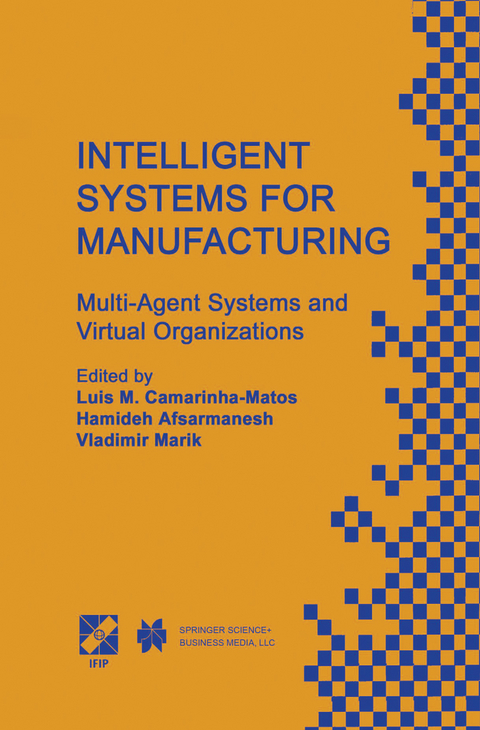
Intelligent Systems for Manufacturing
Springer-Verlag New York Inc.
978-1-4757-5547-3 (ISBN)
One: Multi-Agent Systems and Mobile Agents.- An agent-based approach to holonic manufacturing systems.- PVS 98 agent models and their application in production planning.- Mobile Agent technology in support of sales order processing in the virtual enterprise.- Using multiagent systems and the Internet in care services for the ageing society.- Two: Multi-Agent Systems in Scheduling.- Multiagent perspectives to agile scheduling.- Decentralised resource allocation planning through negotiation.- Scheduling in a Multi-Agent Environment.- Three: Building Multi-Agent Systems.- Agents and objects: Towards component integration for manufacturing systems re-engineering.- Analytical design methodology of agent oriented manufacturing systems.- Agent-based manufacturing: A database point of view.- Four: Intelligent Supervision Systems.- Application of machine learning techniques in water distribution networks assisted by domain experts.- Fuzzy cognitive map model for supervisory manufacture systems.- Using of expert systems in evaluation of high-voltage insulating systems.- Five: Virtual Enterprises.- Virtual enterprises: A Mexican case study.- Concurrent engineering in virtual enterprises: The extended CIM-FACE architecture.- Composing enterprise models: The extended and the virtual enterprise.- Six: Infrastructures for Virtual Enterprises.- Basic services for the management of Virtual Enterprises: A case study.- Secure electronic commerce in virtual enterprises of SMEs.- Extended enterprise communications based on the client / server paradigm.- Seven: Collaborative Work.- Telework Business Process Co-ordination — The supporting tool engineering life cycle.- The “coach” methaphor in CSCW decision making system design.- Eight: Knowledge Based Systems in Design.- Modelingexpertise for selecting manufacturing technology.- Some artificial intelligent techniques to design robotic systems.- Support for component based systems: Can contemporary technology cope?.- Nine: Planning and Scheduling.- A CIM application of a multi-agent system.- Simultaneous design and process planning by indicators.- Solving resource-constrained project scheduling problems using tabu search.- Ten: Modeling in Manufacturing.- Object oriented modelling of product oriented manufacturing systems.- Enhanced production flow schema for modeling the complex resource sharing system.- AOP3S: A balanced approach to model distributed manufacturing systems.- Eleven: Manufacturing Information Systems.- Perspective: A standards-based manufacturing information system.- An approach for real-time applications engineering.- Information systems for eco-effective manufacturing.- Twelve: Product Data Management.- Rule-based management of product data in CIM systems.- Integrating manufacturer and customer: The funSTEP way.- Integrated product model centred design in a virtual design office.- Thirteen: Anthropocentric Approaches in Manufacturing.- Information systems requirements specification through the mediation of technical and organizational perspectives.- Representation of human intent in product models.- Assistance systems supporting operators in manufacturing.- Fourteen: Quality Management.- Knowledge based methods and tools for TQM in small batch flexible manufacturing and complex assembly.- Computer aided part programming for improved part quality and productivity.- Fifteen: Soft-Computing.- Using fuzzy logic in high level control functions.- Fuzzy optimal control of mechanical systems.- A simple robust fuzzy-logic sliding-mode controller of the diagonal type.- Sixteen: PatternRecognition and Diagnostics.- An intelligent pattern recognition algorithm and its application in cutting tool condition monitoring process.- Vision-based sensors for production control — The experience gathered in applications.- Seventeen: Simulation and Design.- Integration of manufacturing system and product design wit DMU.- Development of a feature-based computer-assisted fixturing system.- Eighteen: Theoretical Aspects of Design.- A contribution to algebraic approach for a CAD/CAPP specification.- Interactive design of integrated systems.- Human integration and participation in time constraint workshops with limiting transportation resources.- Nineteen: Workshop 1: Soft-Computing for Automation.- Object-oriented implementation of fuzzy logic systems.- Scheduling the arrivals in a no-wait flowshop with fuzzy processing times.- Fuzzy approximation of the functions minimum and maximum.- Fuzzy knowledge-based prediction of yeast’s morphological characteristics for sparkling wine manufacturing.- Twenty: Workshop 2: Multi-Agent Systems.- Problems of learning in multi-agent systems.- User interface for multi-agent systems: A case study.
| Reihe/Serie | IFIP International Federation for Information Processing ; 1 |
|---|---|
| Zusatzinfo | XXVI, 634 p. |
| Verlagsort | New York, NY |
| Sprache | englisch |
| Maße | 155 x 235 mm |
| Themenwelt | Informatik ► Theorie / Studium ► Künstliche Intelligenz / Robotik |
| Mathematik / Informatik ► Mathematik ► Finanz- / Wirtschaftsmathematik | |
| Technik ► Maschinenbau | |
| ISBN-10 | 1-4757-5547-3 / 1475755473 |
| ISBN-13 | 978-1-4757-5547-3 / 9781475755473 |
| Zustand | Neuware |
| Haben Sie eine Frage zum Produkt? |
aus dem Bereich


